Exploring the Essence of Maa: A Journey Through Poetry
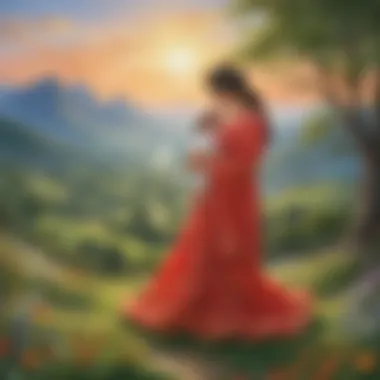
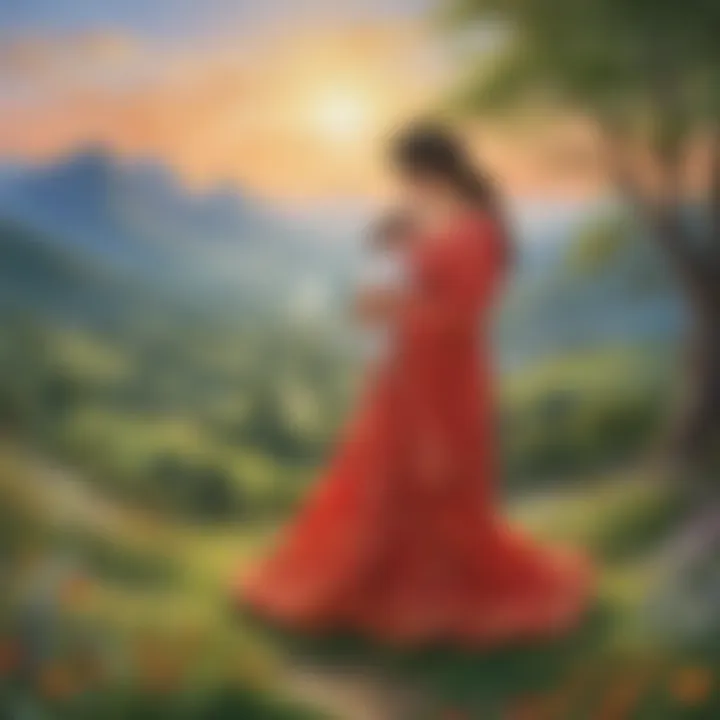
Intro
Diving into the world of Maa, which translates to mother in various languages, opens up a wellspring of emotion and meaning that transcends generations. Poetry has long served as a vessel for expressing the complex feelings associated with maternal figures, capturing the tapestry of love, sacrifice, and unwavering support that mothers embody in different cultures. The journey through this poetic exploration is not just an academic exercise, but rather a heartfelt endeavor to understand how language forms bridges between the past and the present, between child and mother.
The narrative around Maa in poetry is rich and multifaceted. Consider the lines penned by poets from various corners of the globe, each echoing universal sentiments about motherhood. From traditional sonnets celebrating maternal strength to contemporary verses that reflect modern challenges faced by mothers, the themes run deep and wide.
Here's a brief glimpse of what we will uncover: the historical significance of these poems, a closer look at notable works, and reflections on how the essence of Maa continues to evolve in contemporary literature. By the end, we hope to illuminate the profound connections between poetry and the love for mothers, showing how this bond remains timeless yet ever-changing in its expression.
Let's embark on this poetic journey, as we honor the age-old concept of Maa and its relevance across various narratives and poetic forms.
Creative Activities
Engaging children in the exploration of poetry surrounding the theme of Maa can be a rich and fulfilling experience. Below are some creative activities that can deepen their understanding and appreciation of this profound subject.
Craft Ideas
- Mother's Day Poetry Frame: Children can create a special frame for a poem they write about their mother. They can decorate it with drawings or stickers that represent their mom's favorite things.
- Poetry Collage: Gather snippets of poetry about mothers from various sources. Kids can cut out lines they particularly like and arrange them in a collage format, combining them with pictures that represent their relationship with their mother.
Step-by-Step Guides
How to Create a Poetry Frame:
- Gather materials: a plain frame, colored paper, markers, and embellishments.
- Help your child write a few lines about their mother on the colored paper.
- Decorate the frame with drawings or stickers.
- Place the poem inside the frame.
- Give it as a gift on a special occasion.
Making a Poetry Collage:
- Collect various poems about mothers.
- Provide scissors, glue, and a large piece of cardstock.
- Allow children to cut out favorite lines or images from the poems.
- Organize the cut-outs on the cardstock before gluing them down.
- Hang the collage as a tribute to maternal love.
Educational Value
Engaging in these creative activities helps children to not only appreciate poetic expressions but also fosters emotional intelligence. They learn to explore and express their feelings, enhancing their writing skills while building meaningful connections with their mothers.
By immersing young minds in such engaging tasks, we pave the way for a deeper understanding of the emotional landscapes characterized by maternal bonds, all while having a bit of fun along the way!
Fun Quizzes
Quizzes can be a delightful and interactive way for children to test their knowledge while engaging with poetry about their mothers. Here are some ideas for quiz topics and their educational components.
Quiz Topics
- Famous Poets and Their Works: Match poets to their famous works that celebrate mothers.
- Poetic Devices: Identify different poetic devices used in poems about Maa, such as metaphors and similes.
Question Types
- Multiple Choice Questions: Provide several possible answers for kids to choose what best fits a question.
- True or False: Statements about maternal themes that students can validate.
- Fill in the Blanks: Complete lines from popular maternal poems.
Knowledge Reinforcement
Through these quizzes, children will reinforce their learning. They will enhance comprehension skills and gain a better grasp of the emotional and cultural significance lurking beneath poetic lines. Quizzes make learning about the essence of Maa engaging and encourage independent exploration of poetry.
Fact-Based Articles
To further enrich understanding about Maa in poetry, fact-based articles can be a great resource. These pieces often present complex information in a digestible format, encouraging kids to learn more about the cultural relevance and history associated with mother-themed poetry.
Topics
- The evolution of poetic representations of mothers throughout history.
- The importance of maternal figures in various cultures and their poetic reflections.
Engaging Content
These articles usually employ engaging visuals and simple language, making them accessible for young readers. They could include anecdotes from well-known poets or stories about the different ways mothers are celebrated globally through poetry.
The Significance of Maa in Poetry
The essence of Maa, or mother, holds a pivotal position in the realm of poetry. This significance stems from the universally profound connection that exists between a mother and her child, a bond that transcends cultures and eras. In poetry, the theme of Maa is not merely a subject; it embodies the vast spectrum of experiences related to motherhood, touching upon love, sacrifice, protection, and unyielding support. Consequently, poets frequently gravitate toward this theme because it resonates deeply with the human condition.
According to various studies in cultural literature, exploring poetry about Maa offers numerous benefits. It aids in understanding our emotions better, creating a shared sense of belonging and appreciation among readers across different backgrounds. Indeed, poems centered on Maa often serve as a window into diverse cultural contexts, providing insights into the various ways societies celebrate motherhood.
Through the lens of poetry, one can witness the multifaceted representations of a mother. Whether through classic verses or modern expressions, the poems bring to light the struggles, joys, and sacrifices inherent in maternal love.
"A mother's heart is a deep abyss at the bottom of which you will always find forgiveness." – Honoré de Balzac
From cultural rituals to everyday life, the influences and representations of Maa paint a rich tapestry that reflects values, traditions, and collective memories shared amongst communities. In this way, poetry that speaks of Maa enriches our understanding of not only motherhood but also the heritage that cultures uphold.
Cultural Context
Delving into the cultural context surrounding poetry about Maa reveals a tapestry woven with intricate threads. Different cultures depict the maternal figure through unique lenses, influenced by historical, social, and spiritual beliefs. For instance, in Indian tradition, Maa is often revered through festivals, eulogizing her in songs and dances that capture both joy and reverence. This cultural reverence is expressed through literature that celebrates the nurturing aspects of maternal figures, showcasing how these poems communicate societal values and identity.
In contrast, Western poetry may focus on more individualistic interpretations, exploring themes of maternal relationships and their complexities. The cultural context shapes not only the stories told but also how these narratives resonate with readers.
Emotional Resonance
Poetry about Maa taps into the deep emotional reservoirs that lie within us all. It often articulates themes such as love and sacrifice in ways that resonate with shared human experiences. Many times, poets leverage emotional language to forge connections between their words and the hearts of their readers. Because poetry is inherently personal, it reflects raw feelings, eliciting nostalgia, warmth, and even sorrow.
The emotional weight carried by these poems can drive home important lessons about forgiveness, resilience, and the power of maternal love. This sentimentality is crucial as it not only uplifts but also provides comfort to those who may seek solace in the written word when grappling with their own experiences pertaining to motherhood.
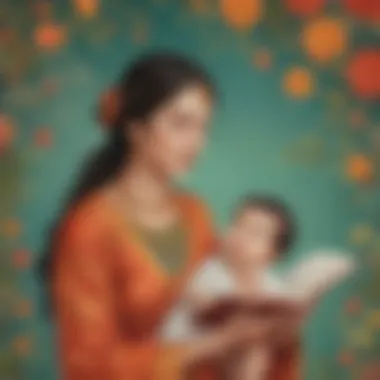
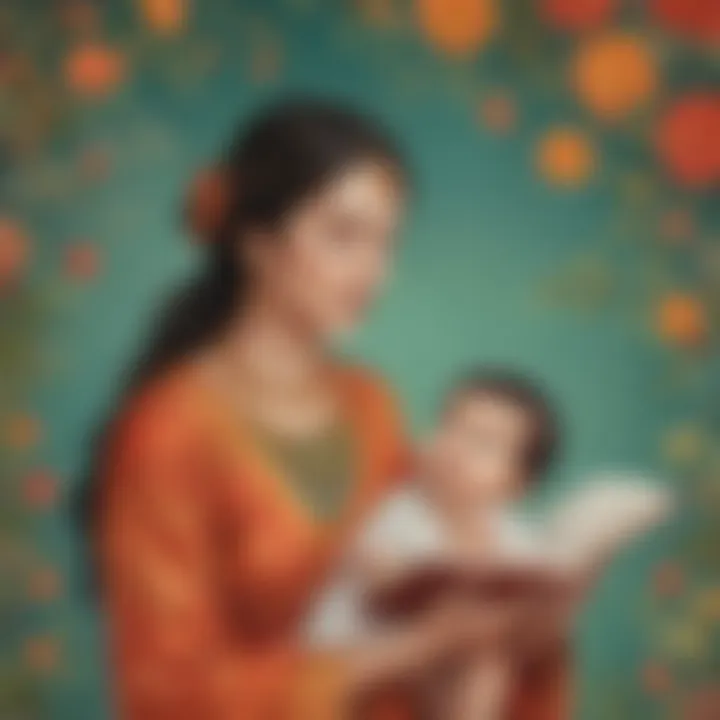
In summary, the significance of Maa in poetry is vast and layered. It connects readers to their emotions while illustrating cultural tapestries and historical backgrounds. Through various forms of expression, the essence of motherhood becomes an integral part of poetic exploration, enriching the way we view both poetry and the relationships we nurture.
Historical Perspectives on Poetry about Maa
The exploration of poetry regarding Maa, or mother, is not merely an artistic endeavor; it reflects significant historical and cultural narratives. This section looks into how poets throughout the ages have expressed their reverence for maternal figures, showcasing the evolution of themes and styles that have emerged in this realm of literature. By investigating historical perspectives, we can appreciate the roots of maternal poetry and recognize its enduring influence in molding societal values and emotional landscapes. Acknowledging this lineage highlights the importance of Maa's role, not just in personal lives but in fabricating the larger cultural tapestry.
Ancient Traditions
Ancient traditions portray Maa as a pivotal figure in many cultures. In several civilizations, the concept of motherhood goes hand in hand with the very essence of nurturing and protection of life. This can be seen in the oral traditions of indigenous cultures, where stories often revolve around heroic maternal characters. These narratives personified qualities like strength, sacrifice, and wisdom, deeply engraining the idea of mother figures into their spiritual and cultural consciousness.
For instance, in certain ancient texts, mother goddesses symbolize fertility and bounty, while in others, they embody safety and warmth. This deep-seated reverence is usually celebrated through poems written to honor these maternal archetypes.
"Maa symbolizes not just birth, but the entire cycle of life."
As time unfolded, these ancient traditions influenced poets who drew inspiration from these rich stories. They articulated their feelings through verse, highlighting the innate bonds formed between mothers and their children. You'd find poems filled with imagery of nature—a mother nurturing her child akin to a tree supporting its roots, stable yet adaptable.
Evolution Through the Ages
The evolution of poetry about Maa is fascinating. From ancient hymns to the contemporary sonnet, the attention to maternal themes has changed considerably. Initially, these poems focused on reverence and worship. As societies progressed, so did the narratives surrounding motherhood.
In the Middle Ages, maternal poetry gained prominence, particularly in Europe, where verses dedicated to the Virgin Mary underscored ideals of purity and devotion. This period left an imprint on how future poets would articulate their admiration for mothers, often juxtaposing them against spiritual themes of sacrifice and grace.
As the ages rolled on, the Industrial Revolution and changing family dynamics impacted the portrayal of mothers. Poets began to explore more personalized, intimate aspects of motherhood. They captured the exhaustion, joy, and complexity that come with being a mother, transforming the simplistic glorification found in earlier works into a more nuanced exploration of maternal experiences.
More recently, modern poets and writers have continued this trend, drawing on the rich histories while incorporating contemporary societal views on motherhood. Today, we see various reflections of mothers—some strong and resilient, while others are depicted as flawed but loving, embodying the full range of human emotion.
In essence, the evolution of poetry about Maa mirrors societal changes and cultural shifts, revealing how different epochs view motherhood. This journey through time showcases not only the artistic growth of the medium but also our growing understanding of the profound impact mothers have on individuals and communities alike.
Various Poetic Forms Celebrating Maa
Poetry, as an art form, embraces diverse ways of expressing deep emotions and connections. When it comes to the theme of Maa, or mother, the various poetic forms play a vital role in weaving together sentiments of love, sacrifice, and nurturing. Each form contributes uniquely to the overall experience and understanding of maternal reverence in poetry, enriching the reader’s journey through its lines.
Lyric Poetry
Lyric poetry is often characterized by its musical quality and emotional intensity. This form captures the essence of personal thoughts and feelings about the mother figure. In pieces that fall under this category, poets express their love and gratitude through vivid imagery and heartfelt phrases. The power of lyric poetry lies in its ability to evoke strong emotions, drawing readers into intimate reflections.
Here’s a small glimpse into the elements that make lyric poetry special:
- Emotional Depth: These poems resonate with readers by highlighting intense feelings, often portraying the warmth of a mother's embrace or the pain of separation.
- Personal Connection: Lyric poems often speak directly to mothers, making them feel like a private dialogue between the poet and their Maa.
- Imagery: Poets paint pictures with words, using descriptive language to evoke memories, sensations, or the very essence of maternal presence.
By immersing oneself in lyric poetry, readers can feel the lullabies and whispers of a mother's love, resonating through time and across cultures.
Narrative Poetry
Narrative poetry, on the other hand, tells a story through its verses, often unfolding life experiences that involve maternal figures. This form allows poets to weave tales that highlight a mother’s journey, the sacrifices she makes, or the lessons imparted over generations. Through storytelling, the bond between child and mother can be vividly illustrated, offering relatable narratives to the audience.
Some crucial aspects of narrative poetry celebrating Maa include:
- Storytelling: Many narrative poems recount events or tales that shape the relationship between a child and their mother.
- Cultural Reflection: These poems often reflect societal norms or familial dynamics, showcasing traditional roles and the mother's influence within the family.
- Relatability: Readers can often see their own lives reflected in these tales, connecting the experiences of others with their own relationships with their mothers.
Ultimately, narrative poetry enriches the idea of Maa by sharing stories that resonate across generations and cultures, breathing life into the concept of motherhood.
Haiku and Short Forms
Haiku and other short poetic forms offer a unique, concise way to express profound thoughts about the mother figure. These brief poems distill feelings and insights into just a few lines, making every word count. This form challenges poets to convey their love and reflections on a mother in an expressive yet succinct manner.
Key elements of haiku and short forms focusing on Maa include:
- Brevity: The limited word count compels poets to be precise, often leaving a lasting impression in just a few lines.
- Imagistic Quality: Short forms often evoke vivid images or moments, such as a mother’s smile or a comforting touch, creating strong emotional responses.
- Nature Connection: Many haikus incorporate imagery from nature, linking the nurturing qualities of the mother to the beauty of the world around us.
By engaging with these compact forms, readers discover that sometimes, the simplest expressions carry the most profound messages.
"In the delicate folds of a few words, love is captured forever, imbuing a timeless essence of motherhood."
In summary, the various poetic forms celebrating Maa each serve their purpose and enhance the appreciation of maternal bonds. From the emotional exploration of lyric poetry to the storytelling nature of narratives, and even the concise beauty of haikus, all these styles elevate our understanding of the integral role a mother plays in our lives.
Celebrated Poets and Their Works
In the realm of poetry dedicated to the theme of Maa, the voices of celebrated poets echo with both tenderness and wisdom. The works of these poets not only preserve the cultural ethos surrounding the concept of motherhood but also allow us to explore varied emotional landscapes. Their words are like an artist’s brush strokes, bringing to life the complex emotions tied to maternal figures. This section will delve into poets revered for their contributions to this rich tapestry, breaking down the characteristics of their works and the impact they have had on generations.
Classic Poets
Historically speaking, classic poets have forged a path that many modern writers tread upon today. One can think of Rabindranath Tagore, whose verses about motherhood instill a deep sense of reverence. His poem "Mother" intricately weaves the bonds of love and sacrifice, capturing moments that ring true across ages. Tagore’s ability to encapsulate the nurturing soul of Maa showcases how poets can transform their raw experiences into universal truths.
Another luminary, William Wordsworth, explored themes of nature and familial affection, including the profound influence of Maa. His words reflect not just a personal attachment but a collective consciousness about the nurturing force in everyone's life.
Through these classic writers, we can see that:
- Emotionally Charged Themes: The love shared between a mother and child transcends time.
- Cultural Significance: Every region has its own set of customs and traditions that affect how motherhood is viewed.
- Symbolism: Classic poets often used Maa as a symbol of safety and wisdom, influencing future interpretations of maternal themes in poetry.
Modern Voices
Moving forward, modern poets have redefined the boundaries of how Maa is depicted. Poets like Rupi Kaur bring a fresh perspective, focusing on the emotional nuances in the mother-child relationship. Kaur’s minimalist style and use of visual imagery resonate with a younger audience while addressing profound themes of love, healing, and strength. Her collection "Milk and Honey" exemplifies how modern poetry can mirror the complexities of maternal bonds.
Ocean Vuong has also made waves with his exploration of identity and motherly love in his works. In his poetry, Maa often serves as a cornerstone—a source of inspiration and struggle, reflecting the multi-faceted nature of motherhood in contemporary societies.
From these modern voices, we can conclude that:
- Fresh Perspectives: Contemporary writers often challenge traditional views on motherhood, embracing diversity and complexity.
- Accessibility: Many modern poets use social media platforms as a conduit for their poetry, making works on Maa widely accessible.
- Emotional Depth: Today’s poets often blend personal experiences with broader societal issues, providing layers of meaning that resonate with readers from all walks of life.
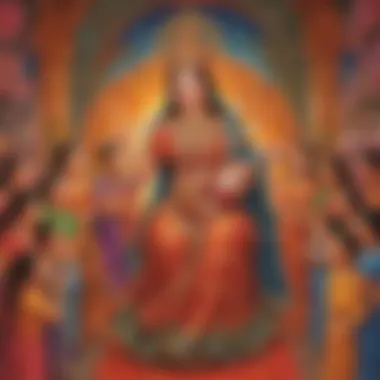

"Poetry is a way to reach out when words fail, a bridge between the unspoken realms of motherhood and the world."
Themes Explored in Maa Poetry
In the realm of poetry centered around the theme of Maa, several profound themes emerge, each carrying its own weight and significance. These themes do not merely serve as decorative elements; they offer deep insights into the emotional ties that bind mothers and children. When exploring these themes, readers can better grasp the feelings of love, sacrifice, protection, and wisdom that are intricately woven into the fabric of maternal relationships. For parents, caregivers, and young children, understanding these themes can enhance their appreciation for the nuances of maternal bonds and nurture a sense of empathy and connection.
Love and Sacrifice
At the heart of many poems about Maa is the theme of love intertwined with sacrifice. Mothers, often regarded as the epitome of love, make countless sacrifices for their children. This idea resonates deeply in poetry and serves to remind us of that unwavering dedication.
- The depth of maternal love often portrays itself through vivid imagery. For instance, a poet might describe a mother enduring hardships like a candle that burns at both ends, illuminating the path for her child.
- Such powerful images evoke both respect and admiration. Readers can feel the warmth of this love, alongside an awareness of the pricing that accompanies it.
Poetry here acts as a conduit, expressing sentiments that go beyond words. It conveys an understanding of how love fuels endurance. As a child reads these verses, they become aware of the complexity of a mother's role—that love sometimes requires a heavy price.
Protection and Safety
Another distinguishing theme is the notion of protection and safety that mothers provide. Poems that explore this theme often draw on the imagery of shelter, nurturing, and an embrace that wards off fears.
- The metaphor of a tree shielding its young branches is often used. This imagery reflects how mothers act as strong supporters. They offer comfort and a sense of security that allows children to flourish.
- Many poets successfully capture the essence of a mother’s instinct to protect her child, painting a picture of strength wrapped in gentleness.
Through the exploration of this theme, poetry helps illuminate the unseen battles a mother fights to ensure her child feels safe. In many cultures, the portrayal of a protective mother reinforces the value placed on maternal instinct, guiding readers to acknowledge and appreciate this vital role in nurturing.
Wisdom and Guidance
Poems that delve into the wisdom and guidance provided by mothers often portray them as figures of vast knowledge and understanding. This theme resonates in relationships that involve teaching, advice, and moral reassurance.
- In many poetic works, a mother’s words are likened to a guiding star, illuminating the path for her child. This imagery accentuates the idea of guidance that is both soft yet firm.
- The exploration of this theme often highlights that a mother’s wisdom is not just about imparting facts but is rooted in experience, patience, and love.
Here, poetry captures the dual nature of being a mother; not only nurturing a child but also shaping their future through wise counsel. This theme can serve to inspire children and bring a sense of respect for the lessons learned from their mothers.
As these themes unfold in poetry, they illustrate the complex tapestry of maternal love, laying bare the emotional landscapes that both mothers and children navigate. Through each stanza, there lies an invitation to connect, reflect, and appreciate the enduring influence of Maa in our lives.
Language and Imagery in Maa Poetry
The language and imagery used in poetry about Maa play a pivotal role in shaping how the essence of motherhood is portrayed. This poetic realm is no mere collection of rhymes; it is a vibrant canvas filled with colors, textures, sounds, and emotions that make the concept of Maa tangible. Language serves not just as a tool for communication, but as a vessel that carries the intricate layers of meanings and feelings that arise from the mother-child bond.
One of the key elements in this poetry is the choice of words. Poets often select terms that evoke warmth and familiarity, sometimes drawing from their cultural roots to highlight the universal nature of motherhood. Additionally, vivid and relatable imagery helps to create emotional connections, making the experiences shared through poetry feel immediate and real.
Symbolism of Maternal Figures
In Maa poetry, maternal figures often embody multifaceted symbols. For instance, a mother may represent protection, nurturing, and unconditional love. These symbols are not just randomly chosen; they reflect cultural beliefs and societal values related to motherhood.
Imagery of the mother as a nurturing tree, for example, illustrates the idea of strength and shelter. Just as trees provide shade and sustenance, the image of a mother encompasses her role as a caregiver. Other metaphors, like the ocean or a lighthouse, symbolize guidance and constant support. Such imagery ensures readers recognize the depth of a mother's influence, transcending mere biological connections.
These symbols often resonate with readers of different ages and backgrounds, offering a shared language through which people can express admiration and loyalty to their maternal figures.
"The language of poetry allows us to speak to the heart, telling stories and sharing feelings that might otherwise remain unvoiced."
Imagery that Evokes Emotion
Imagery is powerful in poetry, especially when it draws on sensory experiences. In poems about Maa, writers frequently use descriptive language to paint vivid pictures that can evoke a range of emotions—joy, sadness, nostalgia, warmth.
Consider the vivid descriptions often employed: the softness of a mother’s embrace, the smell of her cooking wafting through the house, or the sound of her laughter echoing on a quiet afternoon. Each of these images taps into tangible sensations that stir emotional responses. By appealing to sight, sound, taste, and touch, poets create a more immersive experience for the reader.
Moreover, contrasting imagery—like the chaos of life described alongside the comfort of a mother's soothing words—can heighten emotional impact. This juxtaposition serves to amplify feelings of security against life's uncertainties.
Impact of Cultural Practices on Maa Poetry
Cultural practices play a vital role when it comes to shaping poetry that revolves around Maa, or mother. This impact can be seen in how stories are told, how people connect, and how feelings are expressed. In essence, these practices not only enrich the content but also influence the style of the poetry produced.
Through rituals, community events, and family gatherings, the essence of motherhood is celebrated, allowing poets to explore deeper emotional avenues. The significance of this topic lies in understanding how cultural expressions tweak the meaning of maternal relationships and amplify the voices of those who write about them.
Folklore and Oral Traditions
The world of folklore and oral traditions is like a vibrant tapestry woven with stories passed down through generations. Each tale often carries noble lessons and hints of maternal wisdom that strike a chord with people. For instance, many cultures have stories showcasing mothers as the ultimate protectors, reflecting a universal appreciation for Maa. Such narratives not only highlight the importance of mothers but also set the stage for poets to explore various themes centered around motherhood.
- Storytelling Practices: These are rich with the essence of Maa, showcasing her role as a nurturer and guide.
- Cultural Symbols: Objects or symbols often appear in these stories, such as the pot of milk or the protective shawl, which poets use to express maternal affection naturally.
"Folklore is not merely a reflection of life but a guide to understanding the complex emotions tied to it."
Festivals and Tribute
Festivals offer another layer of cultural practice that significantly influences Maa poetry. Celebrate the joys of motherhood through festivities gives poets a canvas rich in color, sound, and emotion. These gatherings often present opportunities to honor mothers, where poems take center stage, allowing voices from different backgrounds to resonate.
- Rituals of Tribute: Many festivals include activities that honor mothers, such as creating specific offerings or performing dances that depict maternal love, allowing poets to draw inspiration from these performances.
- Community Engagement: When families come together to celebrate, the shared stories become a potpourri of experiences that poets use to cultivate their work further.
In summary, cultural practices like folklore and festivals provide essential contexts within which Maa poetry evolves. By tapping into these practices, poets can connect with their audience in a meaningful way, bridging gaps and enriching our understanding of the vital role of mothers.
Psychological Implications of Maternal Poetry
When we dive into the world of poetry centered on the theme of Maa, or mother, we stumble upon layers that resonate deeply within the human psyche. The significance of this poetic exploration is not merely an artistic endeavor but a profound journey into the self. The implications of maternal poetry touch on identity, healing, and the intricate facets of personal and collective memory. These themes serve as a reflection of human experiences that are universally relatable.
Exploring Identity Through Poetry
Every child carries a narrative shaped by their relationship with their mother. This bond, sometimes complex, can reflect in poetry that reveals both joy and sorrow. Through verse, poets often explore their identity, grappling with the feelings of belonging and self-worth that stem from maternal influence. It’s not just about expressing love; it’s a canvas where one paints their existential journey, often mapping out the influences that a mother has had on one's choices and perceptions.
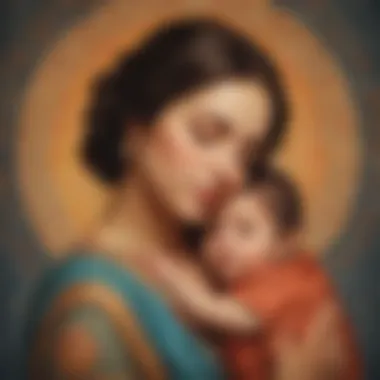
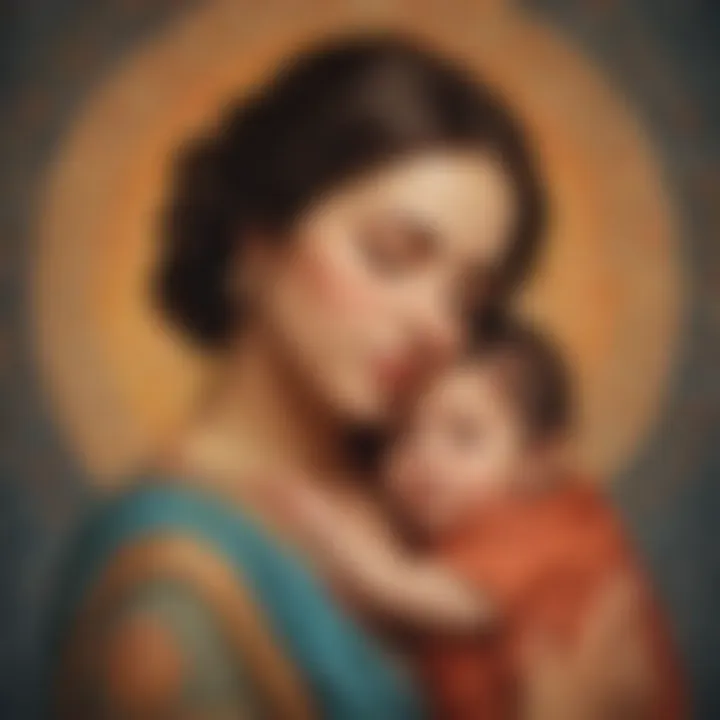
Poetry becomes a mirror, allowing individuals to examine their roots, values, and emotions. For instance, when a poet writes about their mother's strength or vulnerability, they are also delving into their own strengths and vulnerabilities.
- Identity formation: As children grow, they adopt characteristics that they admire in their mothers. This adoption becomes a part of their own identity, visible in the way they navigate life.
- Cultural identity: Poems often carry cultural nuances passed down through maternal lines, and understanding these can enrich one's sense of belonging.
- Personal growth: The act of writing poetry about mothers often symbolizes a period of personal transition. This process can empower individuals to take control of their narratives.
Exploring identity through maternal poetry doesn’t simply capture moments; it creates a dialogue between generations, bridging the past and present.
Therapeutic Aspects of Writing
Writing about maternal figures can also have significant therapeutic benefits. Poetry allows individuals to articulate complex feelings that are often difficult to verbalize. The mere act of putting pen to paper can be a cathartic release, providing solace amidst emotional turmoil.
Complex feelings surrounding love, loss, and longing for a mother can be daunting. Engaging in poetic expression encourages reflection, making it easier to navigate these emotions. Writers often find themselves unwinding thoughts and memories that they may never have confronted without this medium.
A few key benefits of writing maternal poetry are:
- Emotional release: Writing can serve as a safe space to explore overwhelming emotions.
- Processing trauma: Some individuals use poetry to process grief or trauma related to loss or estrangement from maternal figures.
- Building resilience: Expressing painful experiences in poetry can foster resilience, allowing individuals to acknowledge their pain and transform it into creativity.
"Poetry is where the heart speaks, and the mind unwinds". It becomes a bridge to understanding and healing, making the act of writing not just a creative outlet but a therapeutic journey.
Ultimately, the psychological implications of maternal poetry extend far beyond the written word. They delve into the heart of human experience, shaping identity while offering a means of healing through the power of verse. In this exploration, one discovers that poetry about Maa is a profound method for navigating the complexities of emotion and existence.
Contemporary Interpretations and Media
In the vast landscape of modern poetry, contemporary interpretations play a pivotal role in bringing the concept of Maa to life. This section focuses on how today's artists and platforms have interpreted this timeless theme, allowing poetry to flourish in new forms. With advances in technology and shifts in cultural norms, poetry about Maa finds itself in varied environments, making it more accessible and relatable than before. The connections between motherly love and artistic expression are explored through different media, influencing how audiences engage with this deeply personal topic.
Digital Poetry Platforms
Digital poetry platforms have revolutionized the way poetry is shared and appreciated across the globe. Websites and applications such as Wattpad, Instagram, and Medium offer poets a unique space to express thoughts and feelings centered around Maa. These platforms not only allow established poets to share their work but also give budding writers a voice, enabling a diverse array of perspectives that can resonate with a wide audience.
- Accessibility: Anyone with an internet connection can read or share poetry. This democratizes the poetic discourse, allowing various cultural backgrounds to contribute to the theme of Maa.
- Community Engagement: Through likes, shares, and comments, readers can actively engage with poets. This interaction creates a community that celebrates maternal bonds and stories, nurturing a collective narrative.
It is fascinating to see how even young children can use these platforms. They can share their own poems about Maa, learning to articulate their emotions effectively. This accessibility introduces literature in a fun and engaging way, where creativity knows no bounds.
Poetry in Popular Culture
Popular culture serves as a significant backdrop to the exploration of Maa in poetry. It weaves the essence of maternal love into various aspects of life, from movies and music to television and visual arts.
For instance, songs about mothers have historically topped charts, stirring emotions not just with lyrics but with melodies that reflect a deep understanding of the maternal relationship. Movies often depict powerful narratives that spotlight the sacrifices made by mothers, unlocking a reservoir of poetry that relates to their experiences.
Moreover, memes and short videos circulating on social media platforms can distill complex feelings about motherhood into simple yet relatable content, which sparks discussions around the duties, love, and resilience exemplified by mothers.
- Impactful Storytelling: Stories told in films often inspire poetry, as viewers relate to the emotional arcs. This interaction between mediums fosters discussion about themes of Maa in a way that resonates with both parents and children.
- Cultural Reflections: Trends in popular culture reflect societal attitudes toward mothers, influencing how poetry interprets these dynamics. As language and references evolve, so does the expression of maternal love in poetic form.
In pop culture's embrace, poetry finds a new avenue, reflecting the essence of Maa in colors and sounds that dance into the heart.
These contemporary interpretations remind us that poetry is not confined to pages of books; instead, it blooms in everyday experiences, resonating with all ages while offering a rich tapestry of emotions tied closely to the maternal bond. As we navigate through these modern mediums, the theme of Maa remains a fundamental thread, reminding us that poetry will always find a way to connect hearts across generations.
Educational Value of Poetry about Maa
The exploration of poetry centered on Maa offers a wealth of educational value, particularly for young learners, parents, and caregivers. This unique lens on maternal themes provides rich materials for emotional learning, cultural appreciation, and creative expression.
Teaching Emotions through Literature
When children engage with poetry about Maa, they find a powerful avenue for understanding complex emotions. Such poems often encapsulate themes of love, sacrifice, and joy, enabling children to relate these feelings to their own lives. Poetry serves as a mirror reflecting their thoughts and experiences back at them, which is invaluable in the formative years. For instance, when a child reads about a mother’s comfort during difficult times, they can resonate with those feelings and perhaps even discuss their own worries and fears with their parents.
Furthermore, poetry can stir empathy. Reading about other children’s experiences with their Maa can teach children to appreciate their own relationships and recognize similar emotions in others. Poetry often opens the door for discussions, allowing kids to articulate their feelings better. Parents and educators can use these poems as stepping stones to guide children in expressing their emotions more effectively.
Encouraging Creative Expression
Engaging with poetry about Maa doesn't stop at reading; it encourages children to write and create their own stories and poems about their mothers or mother figures. This creative expression is crucial for developing critical thinking and writing skills.
Children can be encouraged to use their own life experiences to craft poems that reflect their feelings towards their mothers. Whether it’s a simple verse about a cozy day spent together or a more elaborate narrative that showcases their mother’s journey, children learn the art of articulation.
Moreover, creative writing helps to enhance a child’s vocabulary and understanding of language. As they play with words and explore various poetic forms, they discover how language can be a tool for expression, not just a means of communication.
"Poetry gives children a voice, a way to express their thoughts and feelings in a world where they often feel they are not heard."
Culmination
In essence, the educational value of poetry surrounding Maa extends beyond mere reading. It infuses literacy with emotional intelligence and creative exploration. This blend not only fosters a deeper bond between children and their Maa but also equips them with tools to navigate their own lives emotionally and artistically.
Personal Reflections on the Influence of Maa Poetry
Poetry centered around the theme of Maa holds a special place in our hearts. It brings forth the essence of maternal love and wisdom, fostering a rich connection with our roots. In this article, we examine how poetry allows individuals—young and old—to explore their feelings about their mothers. It's more than just words; it’s a profound reflection on how mothers shape our identities and lives.
Connecting Generations through Words
The beauty of Maa poetry lies in its ability to bridge generations. For many families, reading or reciting these poems becomes a cherished tradition. Consider a grandmother sharing a verse from her youth with a grandchild. This exchange not only illuminates the emotional weight of a mother's role but also teaches the child about their heritage.
- Nostalgia: When older generations share their stories, they impart snippets of their own experiences and wisdom, creating a sense of continuity.
- Cultural Transmission: Younger audiences learn about cultural values imbued in poetry, allowing them to understand their own historical context.
Overall, the act of connecting through poetry is like passing a baton in a relay race—each generation adds its voice while honoring those who came before.
Writing as a Tribute
Writing poetry about Maa can be a deeply personal act of tribute. It's a way for individuals to articulate feelings that are often difficult to express in day-to-day conversations. By putting pen to paper, people are able to sort through emotions and convey their dedication to their mothers.
- A Canvas for Emotion: For many, writing these verses becomes a therapy of sorts, enabling them to explore complex feelings such as gratitude, love, or even sadness.
- Celebrating Life’s Moments: Through poetry, we can celebrate significant moments—birthdays, anniversaries, or even the quiet, everyday sacrifices our mothers make for us.
As people pen their tributes, they not only acknowledge their personal experiences but also contribute to a larger tapestry of maternal themes within poetry. This act of writing becomes a form of homage to the sacrifices, teachings, and love that define motherhood.
"To be a mother is to watch your heart walk around outside your body." - Unknown
In essence, personal reflections on Maa poetry pave a path to understanding ourselves while cherishing the nurturing influence of our mothers. Through the words we write and share, we bolster connections that transcend time and memory, ensuring that the legacy of maternal love remains vibrant for generations to come.







